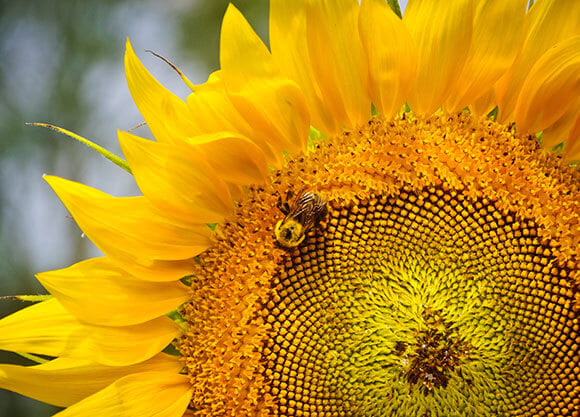
Quinnipiac named Bee Campus USA Affiliate
April 11, 2023

April 11, 2023

“Quinnipiac is working to become a model for sustainability in southern New England and being named a Bee Campus USA affiliate is among the many goals we have set to reach that ambitious goal,” said Bethany Zemba, vice president for community relations and strategy and chief of staff at Quinnipiac.
Biology professors Sarah Lawson and Courtney McGinnis spearheaded the university’s work to become a Bee Campus USA affiliate.
"I am incredibly proud of Quinnipiac's Bee Campus affiliation because it demonstrates the university’s dedication to sustainability,” Lawson said. “One in every three bites of food has been produced through pollination services, therefore, the health of our native pollinator communities is critical in food security and overall human well-being.”
McGinnis agreed.
“I believe Quinnipiac's affiliation as a Bee Campus will help us raise community awareness around how pollinators facilitate and improve food production, contributing to food security and nutrition,” she said.
To achieve affiliate status, the university took several steps, including forming a committee of students, faculty and staff, who meet monthly to discuss creating and enhancing the pollinator habitat, reducing pesticide usage and developing outreach events.
In addition, a pollinator garden was installed at the Albert Schweitzer Institute at Quinnipiac in 2021. Created under Lawson’s direction, the pollinator garden contains eight themed beds hosting 200 varieties of native plants or native cultivars.
The pollinator garden serves as both a research center for scholarship and a means of increasing the area's biodiversity with native pollinators. Additionally, the garden serves as an outdoor space for studying and meditation. Plans call for including paths and multiple seating areas for students to gather.
Another goal of the garden is to provide outreach and education on pollinator conservation. Each section of the garden will include an educational display created and researched by students to explore ideas such as Indigenous peoples' plant use, plants used by different types of pollinators and the impact of climate change. The garden is also used for service-learning projects to allow students to plant native and remove invasive species. The pollinator bed acts as the blueprint for the university’s sustainability planting around the Mount Carmel Campus.
The three new buildings currently under construction in the university’s South Quad will feature a mixed-species ecosystem.
“The ecological value of the habitat will increase with the addition of a mixed-species ecosystem comprised of coniferous, deciduous and flowering trees,” Lawson said. “In addition, shrub layers and ground cover will add a mosaic of habitats to the natural environment.”
She added that mixed-species ecosystems tend to be more productive, stable and provide a wider range of environmental benefits than those containing a single species. By expanding the base of our food web with a variety of native plants, we will be supporting a larger variety of pollinators.
To raise awareness about the plight of pollinators, Quinnipiac plans to publish a webpage to disseminate information to the campus and external communities including QU’s Integrated Pest Management Plan, a list of native plants incorporated into the campus landscape, links to student and faculty research into pollinator issues, and information about upcoming events.
Lawson and McGinnis are excited about the opportunities for student research and service-learning at Quinnipiac, including courses exploring pollinators and removing invasive species.
There are several opportunities at Quinnipiac for students to get involved in sustainability activities, including participating in The Big Event, a day in which the campus community performs community service throughout the region, pollinator garden planting days and Arbor Day activities. They may also join Students for Environmental Action.
The university offers courses on environmental studies and local and global sustainability as well as others that focus directly on pollinators and invasive species removal.
“We will continue to build our practices and leverage our three campuses to promote a healthy regional ecosystem, and to engage in activities that enable current and future students, faculty and staff to embody sustainable habits in their personal and professional lives and thrive in a world increasingly influenced and affected by environmental disruption,” Zemba said.
Bee City USA and Bee Campus USA are initiatives of the Xerces Society for Invertebrate Conservation, a nonprofit organization based in Portland, Oregon, with offices across the country. Bee City USA’s mission is to galvanize communities and campuses to sustain pollinators by providing them with healthy habitats, rich in a variety of native plants, and free of pesticides. Pollinators like bumble bees, sweat bees, mason bees, honeybees, butterflies, moths, beetles, flies, hummingbirds, and many others are responsible for the reproduction of almost ninety percent of the world's flowering plant species and one in every three bites of food we consume.
Quinnipiac Today is your source for what's happening throughout #BobcatNation. Sign up for our weekly email newsletter to be among the first to know about news, events and members of our Bobcat family who are making a positive difference in our world.
Sign Up Now